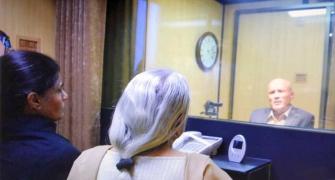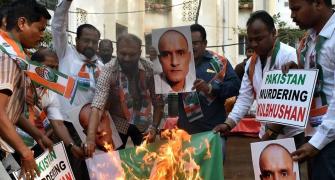
The International Court of Justice, hearing the case of Kulbhushan Jadhav, sentenced to death by a Pakistani military court on charges of being an Indian spy, ruled that Pakistan must review his death sentence and provide him consular access.
Following is the timeline of the Kulbhushan Jadhav case:
March 3, 2016: Pakistan arrests Kulbhushan Jadhav, a former Indian Navy officer.
March 24: Pakistani authorities claim Jadhav, 'an Indian spy' arrested from the Balochistan province.
March 26: The Indian government claims there is no proof that Jadhav who owns a cargo business in Iran was arrested in Balochistan as claimed by Pakistan.
March 29: New Delhi seeks from Islamabad consular access to Jadhav. Over the next one year, it made 16 such requests which were denied by Pakistan.
April 10, 2017: A Pakistani army court sentences Jadhav to death 'for his involvement in espionage and sabotage activities against Pakistan'. India warns Islamabad that it is a case of 'premeditated murder'.
April 11: Then External Affairs Minister (EAM) Sushma Swaraj makes a statement in both Houses of Parliament, that India will go 'out of way' to ensure justice to Jadhav.
April 14: India demands from Pakistan a certified copy of the charge-sheet as well as the judgment in the death sentence of Jadhav and seeks consular access to him.
April 20: India officially seeks from Pakistan details of the trial proceedings against Kulbhushan Jadhav as well as the appeal process in the case.
April 27: Then EAM Swaraj writes to the then Pakistan Foreign Affairs Adviser Sartaj Aziz requesting visa for Jadhav's family to visit him.
May 8: India approaches the International Court of Justice (ICJ) at Hague against Pakistan military courts decision.
May 9: The ICJ stays Jadhav's execution.
May 15: India and Pakistan cross swords at the ICJ over Jadhav's case with New Delhi demanding the immediate suspension of his death sentence and Islamabad accusing it of using the world body as a stage for 'political theatre' through a 'misconceived' plea.
May 18: The ICJ tells Pakistan to put his execution on hold pending its final order.
December 26: Kulbhushan Jadhav meets his wife and mother, more than a year after he was arrested by the Pakistan Army and accused of spying.
April 17, 2018: India files 2nd round of written reply in the ICJ in Jadhav's case.
July 17: Pakistan submits its second counter- memorial in the ICJ on the conviction of Jadhav.
August 22: The ICJ sets February 2019 for hearing Jadhav's case.
November 21: Then EAM Sushma Swaraj seeks diplomatic access to Kulbhushan Jadhav.
February 18, 2019: Four-day hearing in Kulbhushan Jadhav's case opens.
February 19: India urges the ICJ to annul Jadhav's death sentence by a Pakistani military court and order his immediate release.
February 20: India questions the functioning of Pakistan's notorious military courts and urged the ICJ to annul Jadhav's death sentence.
February 21: Pakistan asks the ICJ to 'dismiss or declare inadmissible' India's claim for relief to Jadhav.
July 4: The ICJ announces that it will deliver verdict in the Kulbhushan Jadhav case on July 17.
July 17: In a major victory for India, the ICJ rules that Pakistan must review the death sentence for Kulbhushan Jadhav and provide him consular access.










